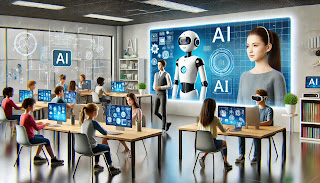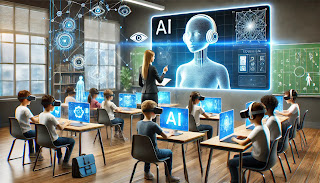Date: Sunday, November 16, 2025
Key Industry Updates
From Microsoft
-
The 2025 “AI in Education Report” shows that 86% of education organizations worldwide are now using generative AI tools. (Microsoft)
-
Yet, there’s a major gap in training: less than half of U.S. students and only about half of educators say they’ve had meaningful AI training. (Microsoft)
-
Key take-aways from the report:
-
AI adoption is accelerating in education. (Microsoft)
-
AI is positioned not as a replacement for teaching, but as a creative and collaborative partner. (Microsoft)
-
AI fluency is becoming a workforce imperative — students need to develop AI-related skills to be ready for future careers. (Microsoft CDN)
-
While the potential is high, challenges remain: responsible usage, readiness, equity. (Microsoft)
-
From OpenAI
-
In their “Building an AI‑Ready Workforce” they report that among U.S. college-aged students (18-24): more than 1/3 use ChatGPT, and for those users, over a quarter of their messages are related to learning/tutoring/school work. (OpenAI)
-
The report emphasizes that many students are self-teaching AI tools and usage, often without formal instruction or institutional support. (OpenAI)
From Google
-
Google’s recent blog “Our latest commitments in AI and learning” announced $30 million in new funding for learning-projects, plus new research studies on the impact of AI in education globally. (blog.google)
-
They also announced partnerships (e.g., with Estonia’s “AI Leap” initiative) and upcoming tools like conversational AI for learning videos (e.g., in YouTube) and wider access to their model Gemini for students and educators. (blog.google)
What This Means for Teaching & Learning
Here’s how these developments affect different grade levels:
Elementary (Grades K-5)
-
Opportunity: AI tools can help personalize learning — e.g., summarizing ideas, generating differentiated prompts, supporting language or math remediation. The Microsoft report shows students are already using AI for tasks like brainstorming (37 %) and summarizing (33 %). (Microsoft)
-
Caution: Younger students may use AI as a shortcut rather than a learning partner. Without proper scaffolding, there's risk of reduced engagement or over-reliance.
-
Action for educators:
-
Introduce age-appropriate AI literacy: what AI is, what it can/ can’t do.
-
Use AI tools with guided tasks (e.g., “Use the AI to help you brainstorm ideas, then we will revise together”).
-
Set clear usage guidelines in classroom: what is acceptable, what is not.
-
Middle School (Grades 6-8)
-
Opportunity: Students at this level are ready for more sophisticated self-directed tasks. AI can support differentiated instruction — generating multiple versions of problems, scaffolding writing, offering feedback suggestions.
-
Caution: The teacher-training gap is real: even though many schools adopt AI, fewer than half of educators feel highly prepared. Students may face inconsistency in how AI is integrated. (Microsoft)
-
Action for educators:
-
Provide mini-lessons on how to use AI effectively (not as answer machine, but as thinking partner).
-
Integrate metacognitive reflection: after using AI, students reflect on what the AI did and what they still did themselves.
-
Collaborate with other teachers/IT staff to develop consistent policies across classes for AI usage.
-
High School (Grades 9-12)
-
Opportunity: High school students are already using AI tools for school work and preparing for college/careers. The adoption data from OpenAI shows usage is significant at this age. (OpenAI) AI can help with complex tasks: research, coding, writing, problem-solving.
-
Caution: Academic integrity concerns rise. The Microsoft report flags issues such as plagiarism and responsible use. (Microsoft) Also, students may skip the learning process if they rely purely on AI suggestions.
-
Action for educators:
-
Revise assignments to embed AI use/expectation: e.g., include component where students show how they used AI, what they modified, reflections on AI output.
-
Offer AI fluency modules: e.g., what prompts work best, how to evaluate AI output, how to use with critical thinking.
-
Partner with counseling / career-readiness teams: help students understand AI competence is becoming part of workforce readiness. The Microsoft report mentions that institutions are under pressure to prepare students accordingly. (Microsoft CDN)
-
Grant Ideas & Resources
Grant Ideas
-
AI Literacy Across Grades Initiative: A proposal to fund professional development + student modules that teach AI literacy (what it is, ethics, prompting, evaluation) from elementary through high school.
-
AI-Enhanced Differentiation Pilot: Fund use of AI tools to support differentiated learning in a middle school setting (e.g., generating scaffolded content, alternative problems) and evaluate impact.
-
Student AI Authorship Portfolio Project: High school students use AI tools to support research/writing, but also reflect on and annotate the AI’s output, documenting their revisions and thought process — grant funds tools, training, student exhibition.
-
AI Career Readiness Program: Given the mention that AI fluency is a workforce imperative, a grant could support a program in high school exploring AI in careers, certifications, partnerships with local tech firms, and mentoring.
Resources
-
Microsoft’s “AI in Education Report” + the “AI Toolkit” for planning. (Microsoft)
-
OpenAI’s “Building an AI-Ready Workforce” white paper. (OpenAI)
-
Google’s “Advance Education Using Google AI” site, which includes tools, guidelines, and resources. (Google for Education)
-
For policy & ethics: the U.S. Dept. of Education’s report “Artificial Intelligence and the Future of Teaching and Learning.” (U.S. Department of Education)


